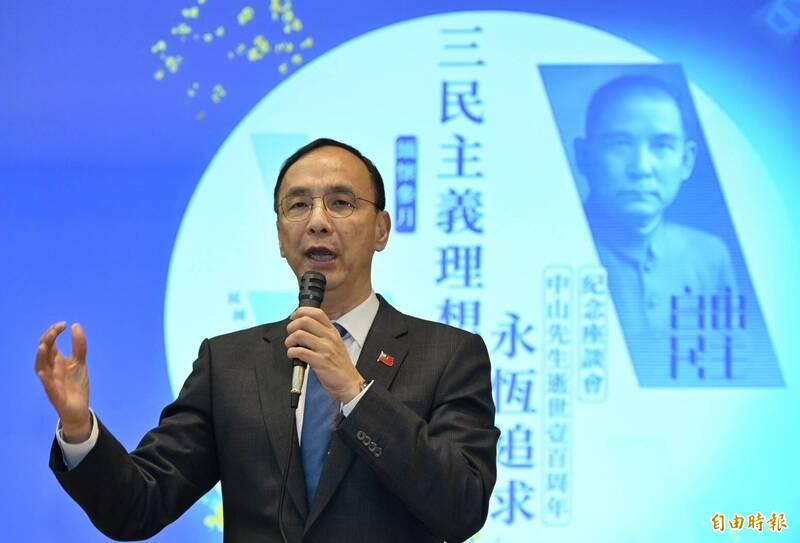The Chinese Nationalist Party (KMT) would launch a campaign to hold a referendum against the abolition of the death penalty, KMT Chairman Eric Chu (朱立倫) told a conference in Taipei today commemorating Sun Yat-sen.
The KMT's decisionmakers, its think tank and its caucus reached a consensus to start a referendum campaign aimed at opposing an end to the death penalty by organizing meetings across Taiwan to secure support from the public, Chu said.
Chu did not explicitly explain why the party was making the move, but KMT lawmakers have advocated pushing referendums to counter a slew of recall motions targeting them.

Photo: Liu Hsin-te, Taipei Times
KMT Legislator Lo Chih-chiang (羅智強) yesterday told Chinese-language media that the party has passed many bills that "reflect popular opinion, but the Democratic Progressive Party [DPP] has objected every time," adding that it was time to “let the public decide.”
The KMT chose the death penalty issue because it has been one of the most discussed topics recently, Lo said.
The KMT has long opposed getting rid of the death penalty.
Its stance was emphasized after the legislature in December last year rejected seven nominees selected by President William Lai (賴清德) to fill vacancies on the Constitutional Court.
The refusal to confirm Lai's nominees came after the Constitutional Court handed down a ruling on a death penalty case in September last year that the KMT denounced as effectively ending capital punishment in Taiwan.
The KMT accused the court of making a "hypocritical" ruling that limits the use of the death penalty and fails to deliver justice.
The KMT's 52 lawmakers and two independents ideologically aligned with the party voted against the nominees picked by Lai at the end of August.
They were joined by the eight Taiwan People's Party lawmakers, giving the opposition a 62-51 majority over the DPP in the 113-seat Legislative Yuan.
Chu described the issue of whether to abolish the death penalty as "important" and said that the government should allow the public to express its opinion.
Although he did not explicitly link the referendum plan to the recall motions, he said the KMT was planning to hold events across Taiwan to improve the public's understanding of the party's position on capital punishment, leading up to a referendum.
The events would also highlight the contributions KMT lawmakers have made and focus on other issues such as Taiwan's energy policies, returning tax surpluses to the public and restoring eight public holidays killed by the DPP, Chu said.
The KMT chairman also questioned the DPP government's economic strategy in the wake of contract chipmaker Taiwan Semiconductor Manufacturing Co earlier this week pledging an additional US$100 billion of investment in the US.
The DPP government should have carefully studied the impact and risks resulting from TSMC's US investment on the domestic industrial sector, Chu said.
Instead, the government simply used TSMC to extricate itself from its troubles, as Taiwan was facing tariff threats from the administration of US President Donald Trump, Chu said.
In a joint news conference with Lai on Thursday, TSMC chairman C.C. Wei (魏哲家) said that TSMC's investments in the US were intended to meet its clients' needs and rejected criticism that the decision was made under pressure from the US government.

A preclearance service to facilitate entry for people traveling to select airports in Japan would be available from Thursday next week to Feb. 25 at Taiwan Taoyuan International Airport, Taoyuan International Airport Corp (TIAC) said on Tuesday. The service was first made available to Taiwanese travelers throughout the winter vacation of 2024 and during the Lunar New Year holiday. In addition to flights to the Japanese cities of Hakodate, Asahikawa, Akita, Sendai, Niigata, Okayama, Takamatsu, Kumamoto and Kagoshima, the service would be available to travelers to Kobe and Oita. The service can be accessed by passengers of 15 flight routes operated by

Alain Robert, known as the "French Spider-Man," praised Alex Honnold as exceptionally well-prepared after the US climber completed a free solo ascent of Taipei 101 yesterday. Robert said Honnold's ascent of the 508m-tall skyscraper in just more than one-and-a-half hours without using safety ropes or equipment was a remarkable achievement. "This is my life," he said in an interview conducted in French, adding that he liked the feeling of being "on the edge of danger." The 63-year-old Frenchman climbed Taipei 101 using ropes in December 2004, taking about four hours to reach the top. On a one-to-10 scale of difficulty, Robert said Taipei 101

Taiwanese and US defense groups are collaborating to introduce deployable, semi-autonomous manufacturing systems for drones and components in a boost to the nation’s supply chain resilience. Taiwan’s G-Tech Optroelectronics Corp subsidiary GTOC and the US’ Aerkomm Inc on Friday announced an agreement with fellow US-based Firestorm Lab to adopt the latter’s xCell, a technology featuring 3D printers fitted in 6.1m container units. The systems enable aerial platforms and parts to be produced in high volumes from dispersed nodes capable of rapid redeployment, to minimize the risk of enemy strikes and to meet field requirements, they said. Firestorm chief technology officer Ian Muceus said

MORE FALL: An investigation into one of Xi’s key cronies, part of a broader ‘anti-corruption’ drive, indicates that he might have a deep distrust in the military, an expert said China’s latest military purge underscores systemic risks in its shift from collective leadership to sole rule under Chinese President Xi Jinping (習近平), and could disrupt its chain of command and military capabilities, a national security official said yesterday. If decisionmaking within the Chinese Communist Party has become “irrational” under one-man rule, the Taiwan Strait and the regional situation must be approached with extreme caution, given unforeseen risks, they added. The anonymous official made the remarks as China’s Central Military Commission Vice Chairman Zhang Youxia (張又俠) and Joint Staff Department Chief of Staff Liu Zhenli (劉振立) were reportedly being investigated for suspected “serious